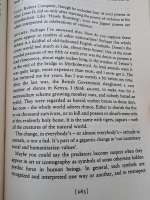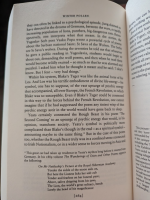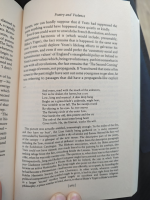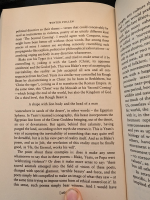You are using an out of date browser. It may not display this or other websites correctly.
You should upgrade or use an alternative browser.
You should upgrade or use an alternative browser.
Yeats
- Thread starter Corpsey
- Start date
Corpsey
bandz ahoy
That's exactly what I said the first time I got some.
I've been especially struck by 2017 corpsey posts lately.
I wanna be that guy again.
I feel that very strongly.
I've been especially struck by 2017 corpsey posts lately.
I wanna be that guy again.
There's a bit in this Spare bio where Baker mentions that towards the end of his life, Yeats took to injecting monkey glands, which was trendy at the time, as a way of prolonging life. This guys invention

 en.wikipedia.org
en.wikipedia.org
The precursor to adrenochrome?
Serge Voronoff - Wikipedia
The precursor to adrenochrome?
Corpsey
bandz ahoy
I was reading Yeats on the train (there's a Snakes on a Plane pun here) yesterday – particularly the really late New Poems: "The Statues", "A Bronze Head", "Lapis Lazuli", "The Gyres", etc. I hadn't read him for a while.
It helped (a lot) that the Selected Poems has notes in the back, otherwise I'd have been totally stumped by much of it.
Anyway, I find reading his poems endlessly fascinating, though not reliably pleasurable (and maybe that's why they're so fascinating). Particularly struck this time around by:
1) his (marooned Romantic) absurdity, which though often provocatively absurd, seems to me too easy to mock – I feel that, having acknowledged he's being absurd, it's important to resist that urge and think about what taking him seriously as he took himself would mean. Auden called out his "ridiculous"ness – but also pointed out that he was only as ridiculous as everybody else is.
The other thing is, and maybe this is a feature of poetry (being more introverted) in general, is the sense of nothing existing outside of his mind. The inhumanity of it. The humourlessness. Compare Joyce, who was a narcissistic show-off and so on, but who fills his stories and novels with people and jokes and liveliness.
2) his visceral disgust re: the "filthy tide" of Modernity – which, much like and part and parcel of his absurdity, enables him to channel forces closed off to the less hysterical, 'reasonable', post-modern mind – "What matter though numb nightmare ride on top, And blood and mire the sensitive body stain?") – I noticed that it's often when he's railing against the "sty" of modern life (and close to being a raving 'rivers of blood' Fascist) that his language is most powerful.
3) the compression of historical epochs, philosophies, personal symbols/resonances into stanzas and lines – this highly compacted depth/breadth of reference which makes these fairly short poems endlessly re-readable (and richer for having read the others).
I wondered if the jarring ugliness of some of his lines is deliberate, a tactic derived from Pound, to avoid things becoming too late-Romantically mellifluous. There's obvious Pound influence (I mean critical, since I've not read any Pound poetry) in stuff like " Aeroplane and Zeppelin will come out. / Pitch like King Billy bomb-balls in /Until the town lie beaten flat."
It helped (a lot) that the Selected Poems has notes in the back, otherwise I'd have been totally stumped by much of it.
Anyway, I find reading his poems endlessly fascinating, though not reliably pleasurable (and maybe that's why they're so fascinating). Particularly struck this time around by:
1) his (marooned Romantic) absurdity, which though often provocatively absurd, seems to me too easy to mock – I feel that, having acknowledged he's being absurd, it's important to resist that urge and think about what taking him seriously as he took himself would mean. Auden called out his "ridiculous"ness – but also pointed out that he was only as ridiculous as everybody else is.
The other thing is, and maybe this is a feature of poetry (being more introverted) in general, is the sense of nothing existing outside of his mind. The inhumanity of it. The humourlessness. Compare Joyce, who was a narcissistic show-off and so on, but who fills his stories and novels with people and jokes and liveliness.
2) his visceral disgust re: the "filthy tide" of Modernity – which, much like and part and parcel of his absurdity, enables him to channel forces closed off to the less hysterical, 'reasonable', post-modern mind – "What matter though numb nightmare ride on top, And blood and mire the sensitive body stain?") – I noticed that it's often when he's railing against the "sty" of modern life (and close to being a raving 'rivers of blood' Fascist) that his language is most powerful.
3) the compression of historical epochs, philosophies, personal symbols/resonances into stanzas and lines – this highly compacted depth/breadth of reference which makes these fairly short poems endlessly re-readable (and richer for having read the others).
I wondered if the jarring ugliness of some of his lines is deliberate, a tactic derived from Pound, to avoid things becoming too late-Romantically mellifluous. There's obvious Pound influence (I mean critical, since I've not read any Pound poetry) in stuff like " Aeroplane and Zeppelin will come out. / Pitch like King Billy bomb-balls in /Until the town lie beaten flat."
Corpsey
bandz ahoy
I find it mysterious that I can pick up and read a poem I've read many times before after a long gap and feel that I've all at once become capable of understanding it in more depth.
Last night I read some Yeats, and read The Wild Swans at Coole—and felt like I'd never grasped before what that poem is 'really' about. What the swans, still fucking and flying after all these years, represent to the ageing poet, who's lost the passion and optimism of youth, and what their flight to some other lake, there to delight some other person (or poet), represents to him, too.
It's a commonplace theme for Yeats ("That is no country for old men / the young..."), and the swans are common too, but anyway I thought it much more understatedly poignant than I ever had before.
Last night I read some Yeats, and read The Wild Swans at Coole—and felt like I'd never grasped before what that poem is 'really' about. What the swans, still fucking and flying after all these years, represent to the ageing poet, who's lost the passion and optimism of youth, and what their flight to some other lake, there to delight some other person (or poet), represents to him, too.
It's a commonplace theme for Yeats ("That is no country for old men / the young..."), and the swans are common too, but anyway I thought it much more understatedly poignant than I ever had before.
Benny Bunter
Well-known member
Benny Bunter
Well-known member
Bunting's got such a great voice and he doesn't 'jangle' the rhymes.
Never really got into Yeats apart from Second Coming but I read a few last night and listened to these and I think I'm starting to get him now.
Never really got into Yeats apart from Second Coming but I read a few last night and listened to these and I think I'm starting to get him now.
linebaugh
Well-known member
SOLOMON AND THE WITCH
And thus declared the Arab lady:
"Last night where under the wild moon
On grassy mattress I had lain me,
Within my arms great Solomon,
I suddenly cried out in a strange tongue
Not his, not mine."
And he that knew
All sounds by bird or angel sung
Answered: "A crested cockerel crew
Upon a blossoming apple bough
Three hundred years before the Fall,
And never crew again till now,
And would not now but that he thought,
Chance being at one with Choice at last,
All that the brigand apple brought
And this foul world were dead at last.
He that crowed out eternity
Thought to have crowed it in again.
A lover with a spider's eye
Will found out some appropriate pain,
Aye, though all passion's in the glance,
For every nerve: lover tests lover
With cruelties of Choice and Chance;
And when at last the murder's over
Maybe the bride-bed brings despair,
For each an imagined image brings
And finds a real image there;
Yet the world ends when these two things,
Though several, are a single light,
When oil and wick are burned in one;
Therefore a blessed moon last night
Gave Sheba to her Solomon."
"Yet the world stays":
"If that be so,
Your cockerel found us in the wrong
Although it thought it worth a crow.
Maybe an image is too strong
Or maybe is not strong enough"
"The night has fallen; not a sound
In the forbidden sacred grove,
Unless a petal hit the ground,
Nor any human sight within it
But the crushed grass where we have lain;
And the moon is wilder every minute.
Oh, Solomon! Let us try again."
And thus declared the Arab lady:
"Last night where under the wild moon
On grassy mattress I had lain me,
Within my arms great Solomon,
I suddenly cried out in a strange tongue
Not his, not mine."
And he that knew
All sounds by bird or angel sung
Answered: "A crested cockerel crew
Upon a blossoming apple bough
Three hundred years before the Fall,
And never crew again till now,
And would not now but that he thought,
Chance being at one with Choice at last,
All that the brigand apple brought
And this foul world were dead at last.
He that crowed out eternity
Thought to have crowed it in again.
A lover with a spider's eye
Will found out some appropriate pain,
Aye, though all passion's in the glance,
For every nerve: lover tests lover
With cruelties of Choice and Chance;
And when at last the murder's over
Maybe the bride-bed brings despair,
For each an imagined image brings
And finds a real image there;
Yet the world ends when these two things,
Though several, are a single light,
When oil and wick are burned in one;
Therefore a blessed moon last night
Gave Sheba to her Solomon."
"Yet the world stays":
"If that be so,
Your cockerel found us in the wrong
Although it thought it worth a crow.
Maybe an image is too strong
Or maybe is not strong enough"
"The night has fallen; not a sound
In the forbidden sacred grove,
Unless a petal hit the ground,
Nor any human sight within it
But the crushed grass where we have lain;
And the moon is wilder every minute.
Oh, Solomon! Let us try again."
Corpsey
bandz ahoy
A hefty chunk of this is a bit remedial, intended to hook in the poetphobic, but worthwhile because I had no idea about the allusion to the prodigal son and what lecturer fella says about how the migration of the poor to the filthy city being behind how famous the poem became seems likely to me
Spoiled it for you here but that's the breaks
Corpsey
bandz ahoy
He does seem to "lose" rhythm sometimes, although I think in his post-Pound work at least this is a deliberate effect, a conscious harshness.His use of traditional rhyme and meter throws me off cause it doesnt always work- it invites you to read in a certain rythmn but then that rythmn is abandoned just as it starts and its a bit distracting for me. Listening to readings helps
Saying that I also wonder about how he read his poems aloud, too, in the video I just posted you can hear him changing/singing "The lake isle of inisfree".
Which I don't particularly enjoy but it does suggest that he was going for a certain melodious effect that might have superceded metre




